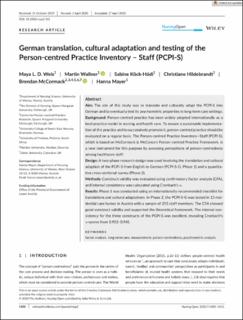German translation, cultural adaptation and testing of the Person-centred Practice Inventory – Staff (PCPI-S)
Weis, Maya L. D.; Wallner, Martin; Köck-Hódi, Sabine; Hildebrandt, Christiane; McCormack, Brendan; Mayer, Hanna
Peer reviewed, Journal article
Published version
Permanent lenke
https://hdl.handle.net/11250/2732340Utgivelsesdato
2020Metadata
Vis full innførselSamlinger
Originalversjon
Weis, M. L. D., Wallner, M., Köck-Hódi, S., Hildebrandt, C., McCormack, B. & Mayer, H. (2020). German translation, cultural adaptation and testing of the Person-centred Practice Inventory – Staff (PCPI-S). Nursing Open, 7(5), 1400-1411. https://doi.org/10.1002/nop2.511Sammendrag
Aim: The aim of this study was to translate and culturally adapt the PCPI-S into German and to eventually test its psychometric properties in long-term care settings.
Background: Person-centred practice has been widely adopted internationally as a best-practice model in nursing and health care. To ensure a sustainable implementation of this practice and to successively promote it, person-centred practice should be evaluated on a regular basis. The Person-centred Practice Inventory—Staff (PCPI-S), which is based on McCormack & McCance's Person-centred Practice Framework, is a new instrument for this purpose by assessing perceptions of person-centredness among healthcare staff.
Design: A two-phase research design was used involving the translation and cultural adaption of the PCPI-S from English to German (PCPI-S-G; Phase 1) and a quantitative cross-sectional survey (Phase 2).
Methods: Construct validity was evaluated using confirmatory factor analysis (CFA), and internal consistency was calculated using Cronbach's α.
Results: Phase 1 was conducted using an internationally recommended checklist for translations and cultural adaptations. In Phase 2, the PCPI-S-G was tested in 15 residential care homes in Austria with a sample of 255 staff members. The CFA showed good construct validity and supported the theoretical framework. The internal consistency for the three constructs of the PCPI-S was excellent, revealing Cronbach's α-scores from 0.902–0.941.

